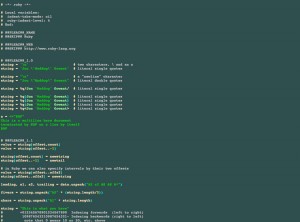When trying to pick up a new programming language, it’s usually helpful to have an apples-to-apples comparison. “I know how something is done in X, but how is it done in Y?” There is a project called Programming Language Examples Alike Cookbook, or PLEAC, that offers up similar solutions for solving the same problem in different languages. It’s basically a one-stop shop for programming language cheat sheets.
The idea for PLEAC came to Guillaume Cottenceau about 10 years ago. Guillaume tells me, “I felt in love with Ruby but at the same time I found Perl a great language, and I liked a lot the Perl Cookbook.” Modeling after that style, he began rewriting all the code examples in Ruby, and realized it would be a great resource for any other language as well. “The aim is to be able to compare languages – on the subset use of one liners and small programs though.”
Currently, many languages are represented, but there is a lot of work still to be done to make this resource fully comprehensive. The languages they’re currently working on are:
- perl, 100.00% done
- groovy, 100.00% done
- ocaml, 100.00% done
- python, 85.43% done
- ruby, 65.57% done
- guile, 47.29% done
- commonlisp, 40.86% done
- rexx, 40.00% done
- tcl, 39.86% done
- php, 36.57% done
- pike, 33.86% done
- haskell, 29.14% done
- merd, 28.86% done
- ada, 26.00% done
- haskell-on-steroids, 20.86% done
- java, 20.86% done
- cposix, 12.14% done
- pliant, 9.43% done
- c++, 8.00% done
- factor, 2.86% done
- smalltalk, 2.29% done
- forth, 2.00% done
- erlang, 1.86% done
- R, 1.43% done
- objective-c, 0.57% done
- masd, 0.57% done
- nasm, 0.29% done
Unfortunately, the project is in a bit of a dormant state as time constraints have been a huge obstacle to active development. Guillaume tells me “Mainly, we lack manpower, but I think it’s the same for all open source projects.” Indeed, it seems with so many demands on our time, sometimes open source projects have to get pushed aside.
If you would like to help breathe new life back into this project, we urge you to join the mailing list and contribute what you can.
Finally, Guillaume offers these words of advice for anyone running an open source project: “what’s important is to enjoy working on the project, and not underestimate the efforts needed to create something usable for the rest of the world.”
